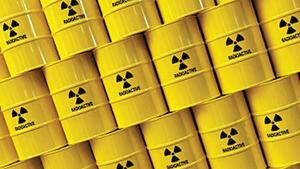Nuclear mattersStates challenge federal policy on nuclear waste storage
The search for a permanent solution to the storage of nuclear waste continues as three states sued the Nuclear Regulatory Commission (NRC) last week over its new policy on spent fuel; in December NRC issued a new policy stating that nuclear waste could be safely stored at a power plant for sixty years after a reactor went out of service; the issue of nuclear storage has become increasingly contentious after the Obama administration ruled out the use of a Department of Energy storage site in Nevada in 2009; nuclear plants have been forced to turn temporary on-site storage into long-term facilities as no permanent site has been built; the Obama administration launched a commission to find alternatives for the permanent nuclear storage site in Nevada that it cancelled

Nuclear waste storage problem persists // Source: mnn.com
The search for a permanent solution to the storage of nuclear waste continues as three states sued the Nuclear Regulatory Commission (NRC) last week over its new policy on spent fuel.
In December NRC issued a new policy stating that nuclear waste could be safely stored at a power plant for sixty years after a reactor went out of service. The attorneys general of New York, Connecticut, and Vermont challenged this new policy citing violation of federal laws that mandate a full environmental review be carried out before a site is granted permission to store spent nuclear fuel.
The issue of nuclear storage has become increasingly contentious after the Obama administration ruled out the use of a Department of Energy storage site in Nevada in 2009. The site had undergone years of preparation to become a permanent storage facility for the nation’s nuclear waste.
With no place to send spent nuclear fuel, nuclear plants have been forced to turn temporary on-site storage into long-term facilities. Many of the plants in operation today were designed when it was assumed that spent fuel would be shipped to a permanent storage facility and only be kept at a plant for a few years.
As efforts to develop a permanent site dragged on, nuclear plants were left to store spent fuel in small spaces not originally designed for long-term storage. As storage space ran out, power plants built “dry casks,” small steel and concrete silos, filled with inert gas, to house spent fuel.
NRC grants a site a license for twenty to forty years for these casks. At the end of the license, NRC will conduct a review to determine if additional precautions need to be taken or if the casks are safe as they are.
These casks are one source of contention for the three states.
David McIntyre, a spokesman for NRC, said the attorney generals had misunderstood the NRC’s policy. He said the December ruling was merely an “opinion” on how long waste could be stored safely and does not grant permission for plants store spent fuel.
He added that the opinion was based on the finding that that the casks were “working really well.”
Sorrell worries that the new ruling will hinder the development of a permanent storage solution. “If we take our feet off the accelerator there, the politics and other considerations of permanent storage will be allowed to go unresolved for a longer period of time,” he said.
He believes the lawsuit will put “more pressure, frankly, on the federal government and the nuclear power industry to come up with long-term — and by that I mean permanent — solutions.”
Nuclear waste continues to pose a problem for nuclear plants even after they are closed, as the presence of nuclear waste makes it nearly impossible to use the land for any other purpose than storage.
In Haddam Neck, Connecticut the Connecticut Yankee nuclear power plant was shut down in 2007, but the land has been unused since because the site still houses twenty-eight years worth of spent reactor fuel in dry casks.
The Obama administration has launched a commission to find alternatives to the permanent nuclear storage site in Nevada that it cancelled.
The commission is considering other locations as well as exploring technologies to reuse spent nuclear fuel.
